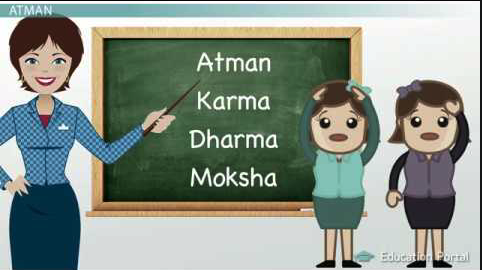This questions and answers document is prepared by a group of Hindu Speakers as a source of information for them or for any one seeking information on Hinduism. There are multiple ways of answering a single question and this group is not claiming to provide all potential answers here.

On Hinduism
The target audience is 9th grader Abrahamic students in American Schools but it will be useful to anyone interested in learning about Hinduism. All answers are designed to answer in about a 3 minute time frame. We have also provided links to other reading materials and video links relating to each question.
Considering Hindu speakers are invariably asked some sensitive geopolitical questions, we have included some potentially sensitive topics here to help speakers answer them from Hindu perspective. However we wish to clarify that this group is composed of Hindus but the group does not have any political affiliation.
Questions starting with “z” are being worked on now. We hope to list some 300 questions and answers below.
If you wish to review these questions and answers in the PDF format, here it is.
If you have any feedback on these QAs, please write to HinduSpeakers@gmail.com. Thank you.

03. General

Yes, I am a Hindu and happy to be one. Hinduism offers me lots of liberty and freedom. I can pray that formless One Ultimate (God) or use any number of forms as Devas (gods). I am not bound to follow strict doctrines, but our scriptures provide me with a very high-level guidance to live a good Dharmic life. Hinduism is not a human centric religion; we are taught to respect animals, mother earth, Sun, Moon and more. The best part of Hinduism is—we believe all religions are valid—a true pluralistic religion.
Other reading material:
Relevant videos: Joy of Hinduism, Nikhil anand: Why I become Hindu, Intro to Hinduism by HAF
Contributor: Dilip Amin
There are one billion Hindus, meaning one out of seven people on this earth is a Hindu.
You may be wondering why in this world there are so many religions, names of God, scriptures, etc? Rig Veda explains it this way in Sanskrit… Ekam Sat, Vipra Bahuda vadanti. There is absolutely One Truth (God, Brahman, Atman…), but the sages call it by many names.
Hindus have liberty to see God in any number of ways. Most Hindus pray to God in many forms as Devis and Devtas. They are not gods but are divine manifestations of God. To use an analogy, if God is Sun then these Devis and Devtas are sun-rays.
Another way of looking at it—assume God as a big government. The finance department is managed by Goddess Laxmi and the education department by Goddess Saraswati. Hindus pray to Lord Ganesh to remove obstacles in life and take guidance from Lord Krishna for how to live a good life.
To seek God, one does not have to look outside but inside. God is sitting inside us, that is your soul or atman. The day God leaves you, your worthless dead body remains. Hindus believe in reincarnation; meaning after death, the soul moves to a new body.
We have many ways to unite or yoga with God, like meditation—Raja Yoga, knowledge—Gnana Yoga, service to others—Karma Yoga and the most popular being the Bhakti Yoga. The Bhakti yoga can be performed at home or at a mandir along with certain rituals.
God is omnipresent. Namaste means I see divinity in you and bow to you. Further, God’s kingdom includes animals, plans, mother earth, sun and moon. We do not have doctrines, like–thou shall not eat beef. Hinduism teaches us to follow our Dharma and follow a non-violent path. Further, it teaches us that animals have a right to life, just as all humans do. Hence, there is an inclination towards vegetarianism.
Important aspect of Hinduism is how to live material life righteously and evolve spiritually which is covered in 4 Purushartas–Dharma, Artha, Kama and Moksha.
We have many scriptures, like Vedas, Upanishads, Puranas, etc. Gita is one of the better known texts and can be considered a self-improvement guide. It teaches us how to be happy in this life and teaches us to do good karma without expectations of fruits.
Hari Om.
.
Other reading material: Short answers to real questions about Hinduism,
Relevant videos: Spiritual Growth through Faith – Hinduism by Mukta Vadera, Living with faith-Dilip Amin, Hinduism by Dilip Amin,
Hinduism is the oldest major religion. Hindus have scriptures, have temples in most countries and one in seven people on this earth is a Hindu.
If you are trying to understand Hinduism with Abrahamic viewpoints, it will get confusing. For example, Hinduism has 1) no founder, 2) has no beginning or projected end, 3) has no commandment but have Dharmic guidance, 4) has no central authority, like Pope, 5) has no apostle (to whom God talked to) but have many learned Rishis and Gurus, and 6) has not “The” Scripture like Torah, Bible and Koran, but have Veda, Upanishad, Gita, Ramayana, and more.
The word “religion” comes from the Latin word Re-Ligare, meaning Re-connect with God. That word serves the Abrahamic ideology that God and human beings are physically separate entities and will get re-connected on Judgment Day. Contrary to that, fundamental Hinduism belief is–God and human beings are inseparable. The day soul (Atman or God) leaves us, our worthless dead body remains. In this respect, the word Re-Ligion is not technically applicable to the Hindu belief system.
.
In many senses, Hinduism is not a religion but it’s a righteous way of living. It’s originally called Sanatana Dharma, the law and order that holds value at all times for the entire mankind. Anyone can follow the principles of Hinduism without being born as a HIndu. No one in a real sense is called a Hindu but you can practice the principles of Hinduism. By practicing principles you don’t become a Hindu but you have become a practitioner of principles of Hinduism. These principles can be anywhere from performing rituals for materialistic benefits to spiritual evolution of realizing Self. Hinduism embraces various philosophies and is also considered as the mother of all religions.
.
Other reading material:
Relevant videos: Swami Chinmaya Nanda, Satguru Bodhinatha,
In the West, often the material prepared to teach Hinduism has not been created by practitioners of the religion and thus lacks the understanding that only comes from actually living the tradition. Further, people (including Hindu youths in the West) exposed to Abrahamic faiths have certain expectations from a religion. Such comparative religion knowledge seekers get confused when they don’t find a specific answer in Hinduism. For example, Hinduism doesn’t have an origin, has no founder, has no commandment but provides lots of guidance. It has no “the” scripture but has a wealth of scriptures. Because of its wealth of scholarship, and traditions of many millenia, it takes time to appreciate the richness of Hinduism.
Other reading material:
Relevant videos: https://www.youtube.com/watch?v=CWLf5qGmIhI
Contributor: Dilip Amin
URL of this page: hinduspeakers.org/ufaqs/z-why-is-hinduism-difficult-to-understand/
In the United States, close to 95% of literature on Hinduism is written by non-Hindus, and almost all educators and instructors in schools and colleges teaching Hinduism are non-practicing Hindus. Unfortunately, that has led to misconceptions about Hinduism and often has created a negative stereotyping of Hindus and Hinduism.
Many Hindus lack the skill to articulate their views on Hinduism concisely. HSB is a platform that brings together those Hindus who want to be public speakers. It also provides opportunities to followers of Abrahamic faiths to learn about Hinduism from practicing Hindus.
Mission Statement: Engage Hindus to academic and religious institutes around the world to promote pluralism and to increase understandings between different faiths.
HSB is a non-profit organization based in the San Francisco Bay Area but has about 130+ speakers around the world.
Email: HinduSpeakers@gmail.com
Youtube: https://www.youtube.com/@hinduspeakersbureau
URL of this page: https://www.hinduspeakers.org/ufaqs/why-was-hsb-created/
Contributor: Dilip Amin
Hinduism or Sanatana Dharma (Eternal Path) is the oldest religion and it originated in the Indian subcontinent (current day India-Pakistan-Bangladesh-Afghanistan-Nepal-Bhutan). It is a sum total of various Indic philosophies and ways of life of the people in the Indian subcontinent. Even though the cultural values vary among different traditions within Hinduism, the common threads of four values binds all the traditions together:
Dharma: The law of the cosmos/true path. On an individual level, one’s personal duty.
Karma: Action (Papa and Punya)
Sansara: Cycle of life (birth-death-rebirth)
Moksha: Liberation of the soul (Atma) from Sansara (the cycle of life and death)
Other reading material:
Relevant videos:
Contributor: Swati Sugandhi
There are over a billion Hindus. One out of seven people on this planet is a Hindu.
1. Let’s start with Who is God? To seek God, you do not have to look outside but inside–to our soul or atman–is God. You do not realize your inner beauty because of your ego, greed, and trying to impress others. Remember, the day that inner spirit leaves you, you are worthless and only the dead body remains, at best the prettiest dead body.
2. Hindus believe in reincarnation; death is not an end but the soul moves to a new body. A tree doesn’t die but it goes back to where it came from, that is dirt, elements and water. In its place, a new tree will come.
3. On how to pray? Hindus have many ways to unite or yoga with divinity, like meditation—Raja Yoga, knowledge—Gnana Yoga, service to others—Karma Yoga and the most popular being the Bhakti Yoga which is devotional in nature.
4. Where is god? God is omnipresent. Namaste means I see divine in you and bow to you. Further, God is present in animals, plants, mother earth, sun and moon.
5. We do not have doctrines, like “thou shall not eat beef.” As an example, Hinduism teaches us to minimize violence – in practice, and even in thought. It teaches us that animals have equal rights on this earth. Therefore, if you feel justified to kill animals just for your taste buds, then it is your choice.
6. We have many scriptures. One popular scripture is the Bhagavad Gita and is the most well-known. It is a self-improvement guide. Gita teaches us how to be happy in this life and teaches us to do good karma.
Other reading material: https://www.hinduismtoday.com/magazine/july-august-september-2019/educational-insight-hinduism-in-a-nutshell/
Relevant videos:
Contributor: Dilip Amin
